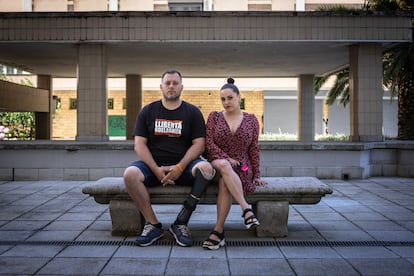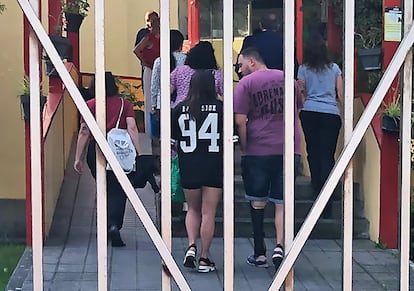The Swiss Six are beginning to adapt to prison.

At the gates of the Villabona prison (Asturias), at nine in the morning, the mother of one of the members of the union group known as the Swiss Six (actually five women and one man) looks at her daughter and then asks, worriedly: "And will they take one of those photos with the numbers, front and side?" The daughter, who is about 30 years old and doesn't speak much, doesn't know. She shrugs. Neither she nor anyone else in the group knows. Nor do the few family members and companions who came to the prison this Thursday, July 10, to bid farewell to the defendants, who will be entering prison in two hours . Finally, one of the companions, who has taught theater classes to inmates for some time, confirms it online and assures: "Yes, they do, but it's not like in the movies: they take your photo, give you a number, and that's it." The answer does not reassure the mother, who silently strokes her daughter's shoulder, who in turn looks apprehensively at the prison gate.
No one knows what goes on behind those walls because no one in this group has ever been in prison or has a criminal record. All of them, around thirty, five women and one man, are or were members of the CNT union. The woman hugging her worried mother in the photo is the worker at the La Suiza bakery in Gijón, whose complaint started it all: an episode that began as a workplace incident like thousands throughout Spain and that has ended, almost nine years later, with the six union members imprisoned, sentenced to three years and six months each for serious coercion and obstruction of justice. They tried to help a worker; the judge ruled that this help—with the collaboration of the interested party—turned into something very close to extortion. The case has ended up reaching the Spanish political and union agenda: 22 Spanish union associations are demanding a pardon from the government, a request that the Asturian government has joined. The Vice President of the Government and Minister of Labor, Yolanda Díaz, has assured that she is already working to ensure that the pardon is implemented as soon as possible. Meanwhile, hundreds of people, according to Efe, demonstrated on Thursday afternoon, hours after the union members were imprisoned, to demand their release. This is not the first demonstration, nor will it be the last.
On the other hand, the bakery owner's family announces that if the government grants the pardon, they will appeal it the following day to the Supreme Court. The Swiss Six 's lawyers have already requested a third-degree prison sentence so the union members can go home to sleep. The bakery owner's son, Pablo Álvarez Meana, responds that they will also appeal this prison sentence. The family promises to give no respite. So far, the Swiss Six have been in prison for three days. A CNT spokesperson comments that the group is "strong" and that they are having a good night's sleep.
It all began on June 15, 2015, when, according to the ruling from Gijón Court No. 1, the bakery worker, who was pregnant, began to feel ill and wanted to go home. The owner didn't allow it, according to the CNT. The woman notified her partner. He argued with the owner and, with a swipe of his hand, damaged one of the refrigerators. The woman then went home and took sick leave due to risk of miscarriage. The owner filed a complaint against the woman's partner. Months later, in March 2017, the worker went to the CNT for help negotiating her dismissal because she never wanted to work there again. She was still on maternity leave and explained that the mere thought of returning to the bakery—where she worked alongside the owner—triggered stress and anxiety attacks because, according to her allegations, she had been subjected to workplace and sexual harassment by him. The latter case was tried separately and dismissed due to lack of evidence. The owner, in turn, accused the worker of filing a false complaint, but the case was dismissed.
Meanwhile, union members took charge of the matter and tried to reach an agreement with the bakery owner. A meeting was held, attended by Héctor González, then general secretary of the CNT Gijón, among others, representing the union. They demanded compensation of just over 6,000 euros for various reasons (overtime pay, vacation days, unfair dismissal, etc.) and, in addition, the withdrawal of the complaint against the couple. "It was a way of trying to settle the matter once and for all. We could have bargained. What we wanted was to negotiate," González asserted last Wednesday. The owner disagreed. And the union decided to put pressure on the bakery's door, located on a long, two-lane commercial street, Schultz Avenue. From May to September, CNT members organized 15 demonstrations in front of the bakery, a small business where—in addition to the owner, his wife and daughter—two other employees worked. Half of the demonstrations were reported to the Government Delegation. The other half weren't. Only a dozen people (all CNT members) attended the first ones. Later, more people joined, often neighborhood residents. On occasions, more than 80 protesters gathered in front of the bakery. "They weren't violent, but sometimes they intimidated those who came to buy something. I sometimes went to get a coffee and they insulted me for it," said a saleswoman from a nearby shop. The demonstrations lasted between an hour and an hour and a half. Shouts of "harasser" and "go away now" were heard. On a couple of occasions, a couple of firecrackers and a couple of stink bombs were thrown. "I don't think that's coercion," commented Héctor González last Wednesday, recalling, by way of comparison, episodes of union struggle in Gijón in which buses were hung from shipyard cranes.

The ruling, upheld by the Provincial Court and the Supreme Court, states that the owner was forced to close the business due to pressure and move to another city, suffering "serious financial and psychological hardship." He has now opened a new bakery in Oviedo. The union members counter that the bakery was for sale before it all began. "My parents wanted to sell the bakery before all this started, it's true, and move to Andalusia," explains the son, Pablo Álvarez Meana. "But in the end, due to what happened, they sold it quickly, losing money: that's why the ruling calls for compensation of 120,000 euros." This amount was paid in part by the union and in part by raising funds through raffles, donations, and concerts, according to the CNT.
Hug parentsThis Thursday, at 11 a.m. on a sunny morning, more than eight years after the demonstrations—when there's no longer a trace of the bakery on Schultz Avenue and in its place stands a supermarket warehouse—the six union members are preparing to voluntarily enter prison. They hug their parents and partners, call their young children to say goodbye. Héctor González and his wife, Rosa Blanca, also a member of the Swiss Six, will be admitted together. They will leave their ten-year-old son in the care of his grandparents. They all have jobs: teachers, taxi drivers, social workers, veterinarians... Rosa Blanca is a singer in an orchestra. They told her she had to go to prison immediately on Wednesday afternoon, on her way to a gig in Burgos. "The rest of the orchestra left me at a gas station to come pick me up," she explains. "I hope this doesn't last long and I can take advantage of the summer, which is when we have the most galas." Most of them are against having their photos taken head-on, or being identified by name in the article. They don't want to be recognized in Gijón; it seems they no longer want to be union heroes. They're tired of the case, hoping the judge will forget about them so they can return to their old lives. But the family that owns the bakery swears they won't forget: "We'll do everything possible to make sure they serve their full sentences. To me, they're not union members: they're criminals," asserts son Pablo Álvarez Meana, who on his X account (formerly Twitter) describes himself, among other things, as "Security Advisor to President Donald Trump" and "ANTI-COMMUNIST."

EL PAÍS




